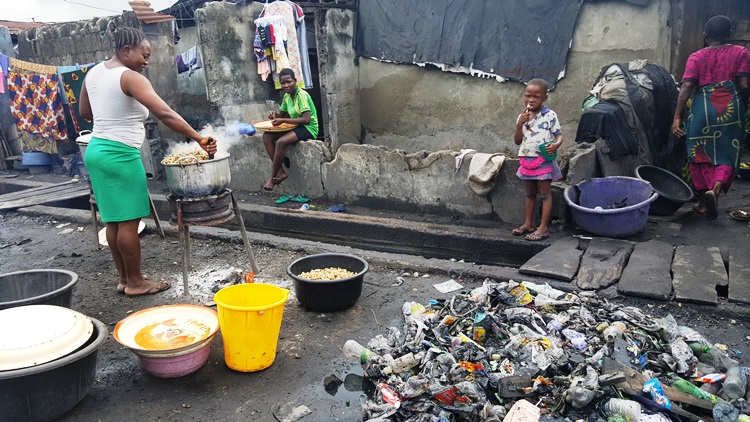Lagos, Nigeria – The vibrant street food culture has been marred by growing concerns surrounding the lack of hygiene practices among vendors who sell and cook their food in close proximity to open gutters. While street food has long been a beloved aspect of Lagosian culinary traditions, the presence of unsanitary conditions poses significant health risks to consumers.
Lagos boasts a diverse array of mouthwatering street food options, ranging from the famous suya and flavorful jollof rice to the delectable akara and irresistible ewa-Agoyin (Yoruba Beans), and a long list of wonderful traditional soups. However, the sight of street food stalls set up near open gutters has raised alarm bells among health experts and consumers alike due to the potential for contamination.
One of the primary issues contributing to this concern is the unhygienic environment in which street food vendors operate. Open gutters, notorious for accumulating waste, sewage, and debris, serve as an unfortunate backdrop for many street food stalls. The close proximity between the cooking and eating areas and these unsanitary conditions greatly heightens the risk of contamination.
As vendors prepare and cook their food in such an environment, the ingredients and cooking utensils are exposed to various pollutants. This exposure significantly increases the likelihood of food contamination with bacteria, pathogens, and other harmful substances.
Consumption of food prepared under these unsanitary conditions can lead to severe health consequences, including the risk of contracting diseases such as gastroenteritis, typhoid fever, cholera, and food poisoning. Gastroenteritis, characterized by inflammation of the stomach and intestines, causes symptoms like diarrhea, vomiting, and abdominal pain. Typhoid fever, a bacterial infection, leads to high fever, weakness, and gastrointestinal complications. Cholera, another bacterial infection, results in severe diarrhea and dehydration. Food poisoning can occur from consuming contaminated food, causing symptoms such as nausea, vomiting, abdominal cramps, and diarrhea.
Moreover, the strong odor emanating from the open gutters can further compromise the quality and hygiene of the food, deterring potential customers and tarnishing the reputation of the street food culture.
Inadequate waste management exacerbates the situation, as food waste and litter often find their way into the open gutters. The accumulation of waste and the lack of proper drainage systems create a breeding ground for pests, including rats and flies, which pose additional health risks.
Recognizing the urgency of the situation, we are urging the Lagos State Ministry of Health to take steps to address the hygiene concerns surrounding street food vendors near open gutters. Efforts should be made to Collaborate With local authorities, to improve waste management systems and promote hygiene practices among street food vendors.
Efforts should be made to educate vendors on the importance of maintaining clean cooking environments and adhering to food safety regulations. Vendors should be advised to select areas away from open gutters or other unsanitary conditions when setting up food stalls. It is crucial for vendors to prioritize personal hygiene by regularly washing their hands with clean water and soap or using hand sanitizers. Proper food handling and storage are essential to prevent cross-contamination, and vendors should clean and sanitize cooking equipment and utensils regularly.
In addition to personal hygiene, effective waste management practices are crucial. Vendors should provide trash bins and regularly empty them to maintain cleanliness and prevent the attraction of pests.
By taking these measures, vendors can improve the overall hygiene standards of street food and mitigate the risks associated with unsanitary conditions near open gutters.
While street food offers a rich tapestry of flavors and cultural experiences, it is essential to prioritize personal health and safety. By raising awareness about the risks associated with unsanitary environments, both vendors and consumers can work together to ensure a safer and more enjoyable street food experience.
With concerted efforts from the government, local authorities, and conscientious consumers, the street food culture can be transformed into a model of cleanliness and hygiene. By implementing stricter regulations, providing proper waste management infrastructure, and offering training programs for vendors, the city can pave the way for a thriving street food scene that prioritizes the health and well-being of its residents and visitors alike.



